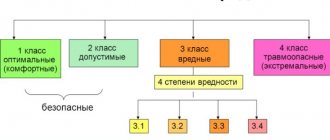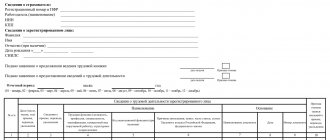- home
- Reference
- Privileges
Many citizens who have reached retirement age are increasingly asking questions related to their financial security in old age. For the majority of the population, the reforms taking place in the country related to changes in the pension system are not entirely clear, and many people are already confused in the incessant stream of bills and initiatives.
However, it is already obvious that the retirement age in the country is increasing, but questions arise regarding the categories of workers who have benefits when entering retirement. These include, among others, teachers in preschool institutions.
Formation of a pedagogical pension for kindergarten teachers
Due to the specific nature of their work, teaching staff are subject to significant psycho-emotional stress, which negatively affects their health and ability to work. In addition, working with children involves a greater degree of responsibility, which also gives pedagogical activity a special specificity.
In this regard, the state provides a number of benefits and concessions for this category of workers. This also applies to early retirement. Thus, kindergarten teachers have the right to submit applications to receive pension payments if they have a certain teaching experience.
In essence, this procedure for the formation of pension rights represents length of service. It should be recalled that it is precisely on the principle of having sufficient special experience that civil servants, military personnel, representatives of law enforcement agencies and some other fields of activity retire.
However, in modern practice, it is not customary to call the special experience of teachers and physicians length of service, since, in addition to its availability for the persons in question, they are also subject to other requirements for the assignment of pension benefits.
So, it has been found that one of the most important grounds for the retirement of preschool teachers is the presence of sufficient special experience. However, it is developed only under the condition of labor activity in certain institutions and in relevant positions.
Thus, their complete lists are contained in the Decree of the Government of the Russian Federation dated October 29, 2002 No. 781. They are quite extensive and include more than a dozen positions. As for kindergarten workers directly, beneficiaries should include those who are directly involved in teaching activities.
These are, among others:
- educators;
- speech therapists;
- music workers;
- educational psychologists.
Supporting, administrative (for the most part) and technical staff of preschool institutions are not among the beneficiaries.
Important! Junior educators (nannies) are not teaching staff, even if they have a specialized education. In this regard, this category of preschool educational institution employees is not entitled to count on pension benefits.
In addition, it is legally established that teaching experience includes time spent working in state (municipal) preschool institutions. This means that if, for example, a teacher works in a private kindergarten or provides educational services privately, then these periods are not included in the length of service.
The formation of pension rights for teachers is carried out in the same way as for the majority of the working population of the country. The pension is assigned by application when applying to the state pension fund.
It should be noted that if an education worker decides to receive well-deserved payments, then he can no longer work in this area, which, however, does not prevent him from carrying out other types of work.
The procedure for applying to the Pension Fund of Russia is standard , however, when preparing documents, it is necessary to obtain in advance the necessary certificates about the existence of a special right, as well as check the correctness of the existing entries in the work book.
Consequences of future reform
The bill receives different assessments: the government and the Pension Fund declare a lot of positive aspects of the planned reform, while the media promise a sad forecast for the economy and citizens.
This is interesting: How to withdraw the funded part of your pension
The latest public survey showed that only 9% of Russians agree with the innovations, while about 90% are not ready for such changes.
Increasing the retirement period for educators will lead to the following negative consequences:
- rising unemployment among older people and the younger generation;
- worsening crisis in the economic sphere;
- decrease in labor productivity.
The government is convincing the population that there will be no need to worry about jobs in the coming years. Although no plan has been presented to improve the labor market situation at this time, similar measures may be expected in the future.
If appropriate measures are not taken, citizens will have to face increased unemployment.
Elderly people who had to leave the position of a teacher to take care of their own health and pay attention to their grandchildren will be forced to continue working. Thus, jobs intended for young professionals who have just completed their studies will be filled.
At the same time, not every employer will agree to retain an elderly employee or hire a teacher over 50 years of age. In this case, citizens of pre-retirement age will be forced to look for work outside of the teaching field, receiving lower wages and facing more difficult working conditions.
The economic crisis, from the point of view of many experts, is also inevitable. Previously, pensioners continued to work as educators after retirement, because they needed to have an additional source of income.
It's no secret that pension payments are not large enough for citizens to fully meet their needs.
The loss of additional income in the form of pension payments and employment in lower-paying positions will lead to a decrease in consumer demand for many consumer goods.
Attracting young specialists is an important detail for economic development. A citizen who has just completed his studies has purposefulness, energy, and greater dedication. The lack of jobs for young people will lead to a decrease in labor productivity.
At what age do kindergarten workers retire?
In Russia, as well as in many other countries of the world, great importance is given to retirement age when exercising the right to material security. It should be understood as the age when a citizen can acquire pensioner status and the right to appropriate payments. Today, the majority of Russian citizens retire at an advanced age.
Teachers belong to the preferential category of workers, so the grounds for their right to pension payments are not related to age. This means that if they have sufficient experience, kindergarten teachers can retire without taking into account the number of years achieved up to that point.
However, a prerequisite for assigning security is the accumulated volume of pension rights, expressed in the form of an individual pension coefficient (IPC). Its value is formed by the insurance contributions received by the pension fund, which are made by employers for each of their employees.
Accordingly, every working citizen has his own IPC in the pension insurance system. To retire in 2020 (first half of the year), the coefficient must be at least 18.6.
Reference! If the IPC value is lower than established by law for a certain period, then a preferential pension cannot be assigned.
What teaching experience is required to apply for a long-service pension?
Pensions for employees in the education sector are granted if they have worked in this industry for at least 25 years. At the same time, the teacher himself must clearly understand which periods are included in the special training. Let's look at this in more detail.
- Actual performance of labor activity . Only periods of work in institutions and positions provided for by law will be counted.
- Periods of incapacity. We are talking about a period when a teacher was temporarily not working due to illness or caring for a sick relative. These circumstances must be confirmed by sick leave.
- Vacations . The length of service includes periods of primary and additional leave, which is directly provided for by the Labor Code.
- Holiday to care for the child. This period is included only if the leave to care for a child up to one and a half years old was used before October 1992.
It should be understood that when calculating length of service, only those periods are taken into account when the teacher worked full time, that is, he worked the norm established by law, defined in hours. It is different for different categories of teaching staff. Thus, educators must work at least 30 hours a week.
Important! Teachers working with disabled children have a lower work rate of 25 hours.
Did the reform affect the exit age?
The reform of the pension system carried out in the country has affected many categories of workers. Kindergarten teachers, as well as other teachers, are also affected by the changes.
Thus, it has been established that the minimum teaching experience for going on vacation is 25 years. This condition remains unchanged. However, starting from 2021, there is a deferment in granting a pension for educators.
In practice, this means that after 25 years of work in the field of preschool education, a specialist acquires the right to a pension, but it will be accrued to him after a certain period. At the beginning of 2021, the delay has already been a year and a half.
Example! Citizen Ivanova worked in a municipal kindergarten as a teacher for 25 years. This deadline fell in January 2021. She has already earned the right to a pension, but payments will not be made to her until July 2021.
Starting in 2023, the deferment period will be 5 calendar years. Accordingly, if the right to a pension begins in 2023, the money will begin to be paid no earlier than 2028. However, it should be noted that if the work activity was carried out in difficult climatic conditions, the list of places with which is approved by the Government, then the calculation procedure will be made taking into account these circumstances.
Thus, it actually turns out that teachers will retire 5 years later than was previously established.
Today, preschool teachers, like other teaching staff, have the right to preferential retirement. To receive appropriate payments, they must work in the industry for at least 25 years. However, starting from 2021, a rule has been in force according to which pensions for this category of workers will be assigned taking into account the deferment.
Will I be able to use utility benefits after dismissal without waiting until retirement age?
No, you will not be able to take advantage of this benefit until you retire. Since working teaching staff are entitled to compensation for utility bills, the benefit is also reserved for retired teaching staff who have worked for at least 10 years in rural and regional settlements.
Law of the Khabarovsk Territory of December 20, 2006 N 90 “On the amount, conditions and procedure for reimbursement of expenses associated with the provision of social support measures to teaching staff of regional state and municipal educational organizations living in . (as amended on November 27, 2013)"
Article 2. Amount and conditions of compensation
Article 3. Compensation procedure
7. The right to receive compensation is reserved for retired teaching staff of regional state and municipal educational organizations, who have worked in rural settlements for at least 10 years and have enjoyed this right when moving to a new place of residence in another rural settlement or working settlement (village urban type) on the territory of the region. Compensation is provided by an educational organization or local government body of a municipal district at the place of new residence of a retired teaching worker in accordance with Part 1 of this article.
This is interesting: How to retire at 53









